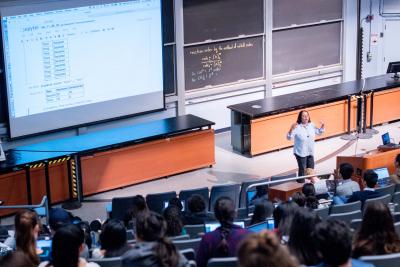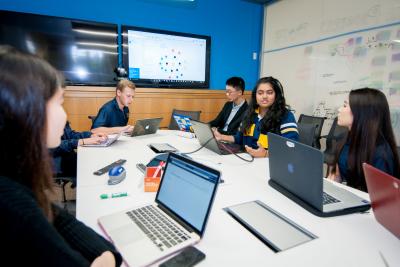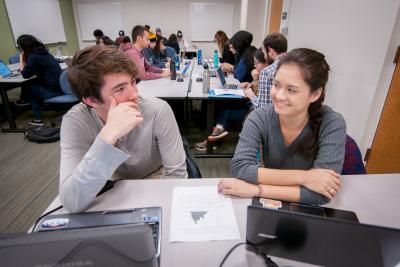UC Berkeley’s Data Science education program reached new heights in 2016 and is poised for further growth in 2017. Approximately 500 students enrolled in the entry-level course, Foundations of Data Science, and hundreds more in connector courses spanning topics ranging from neuroscience to media studies. Below are highlights from a semester that helped establish a model for refining and extending the curriculum to a broader spectrum of students and adding advanced classes in coming semesters.

Professor Ani Adhikari teaching Foundations of Data Science lecture.
Core course draws diverse mix of students, majors
Drawing 500 students from 56 different majors, the core Foundations of Data Science course introduced data science to a wide swath of students across the campus. Designed for freshmen and sophomores of all majors, Foundations of Data Science (familiarly called Data 8) teaches core computational and inferential concepts while enabling students to work constructively with real data. Students work on projects such as analyzing water use in California and identifying musical genres based on data analysis of song lyrics.
Starting from Data 8, rather than from advanced classes, has let Berkeley build its data science curriculum from the ground up.
“All students should have access to a course that develops data literacy, so that they can use modern data analysis as an approach to any problem or investigation that they encounter in any discipline,” said Ani Adhikari, a professor of statistics who taught the course this fall and was one of several faculty who worked together across departments to develop it.
“We’ve had strong engagement from students in literature, history, ethnic studies, areas that aren’t traditionally seen as related to Data Science—since today, studying any of these fields will also involve computing with data,” said DeNero.
Connecting data science to multiple domains

Alexei Pozdnukhov teaching Data Science for Smart Cities connector course.
Connector courses offered in coordination with Data 8 bring data science approaches directly into the experience of students in many majors, enabling them to use these skills later in their studies. They also typically offer a smaller and more focused learning experience for students. This fall, a dozen connectors were offered in fields of study ranging from neuroscience to demography, from “smart cities” to child development.
Connector instructors from departments across campus say that the courses have provided valuable learning for students and faculty alike.
Students take active role in building data science

Data science student team members at work.
This fall, an engaged student community continued to coalesce around the Data Science education program. Undergraduate student teams support key parts of the program’s work, and student staff are actively engaged in assisting instructors and teaching. Four independent student groups offer tutoring and follow-on opportunities for data science projects and careers.
Student organizers partnered with the Data Science Initiative and the D-Lab this fall to initiate the Data Scholars program, a community providing a welcoming environment and support resources to underrepresented students taking Foundations of Data Science.
“The whole goal of this course is to make data science as accessible as possible to students of many majors and backgrounds,” said Luis Macias, a senior American Studies major who helped launch the Data Scholars program. “Data Scholars is an extension of that, and we want to be proactive about making sure there’s not a diversity problem in data science at Berkeley.”
New lab spaces provide home for collaborative work

Foundations of Data Science students collaborating in one of the new lab spaces.
Inexpensive renovations in three instructional lab spaces in the summer of 2016 have provided full-time space for Foundations and connector labs and office hours. Each lab includes about 30 seats, clustered into groups around shared table space so that students can collaborate together on homework and projects.
Looking ahead to 2017
In Spring 2017, the campus’ data science curriculum will continue to expand, a highlight being the launch of three new advanced courses that that take Foundations of Data Science as prerequisite. In addition, several new connector courses will be offered, including a history course in which students will use digital sources to explore the dark history of Japanese-American internment during World War II.
This news item was updated on Jan. 10, 2017. For updated information about Berkeley's data science plans, please see below.
Update on Berkeley's data science plans
Berkeley’s leadership also recently affirmed the campus’ commitment to data science. In December, campus leaders announced the establishment of a new Division of Data Science and in January, an internal search was launched for an interim dean of the new division. This spring, faculty plan to start drawing together proposals for data science major and minor programs of study, which will need to be approved by the colleges and the Academic Senate.
View a detailed report on the Data Science Education Program’s first year>>
Photo Credits: Keegan Houser

